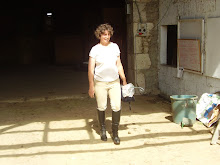Today I went to the home of two boys that I taught in primary school two years ago.
Their mother wanted me to help them because now they are in middle school and they are having difficulties. I sat and talked to them in English for half an hour. I asked them if they had bicycles and we talked about their bicycles, their dog and their cats. We talked about what they like to do, how they go to school, what they want for Christmas. We had a real conversation. All in English. I was delighted to see that they had retained quite a bit of what I had taught them. They were both using "so-so", an expression I taught and which is not in the middle school textbooks.
I asked to see their notebooks to see where the problem was. I saw a page where next to an example in English there was an explanation of the genitive form. The explanation was in French. Do you think a thirteen year old boy knows what genitive means? Do you think the average native English speaker knows what genitive means? Do you think that a well-educated French person who has not studied English or Latin in the university knows what "génitif" means?
I can help these boys learn to speak English better. We can continue to chat in English and their English will improve. But I explained to the parents that I will not spend time helping them to do pointless exercises that are a waste of valuable class time. Does being able to recite a rule of English grammar in French make anyone a better English speaker?
It takes thousands of hours to become a fluent speaker of a foreign language. Students have only a few hundred hours in class. So shouldn't we be putting that precious time to the best possible use, speaking the language, rather than talking about the language in their mother tongue?
Wednesday, November 21, 2012
Subscribe to:
Post Comments (Atom)

No comments:
Post a Comment